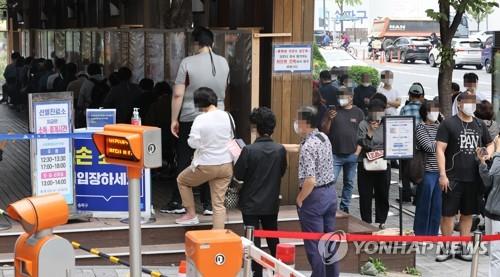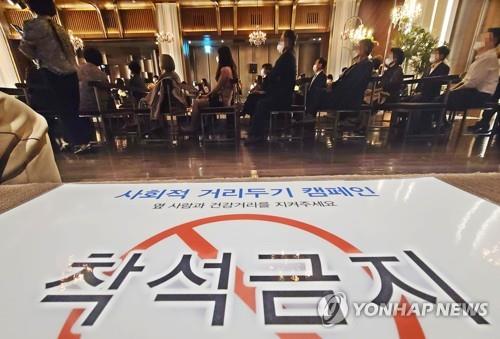- California Assembly OKs highest minimum wage in nation
- S. Korea unveils first graphic cigarette warnings
- US joins with South Korea, Japan in bid to deter North Korea
- LPGA golfer Chun In-gee finally back in action
- S. Korea won’t be top seed in final World Cup qualification round
- US men’s soccer misses 2nd straight Olympics
- US back on track in qualifying with 4-0 win over Guatemala
- High-intensity workout injuries spawn cottage industry
- CDC expands range of Zika mosquitoes into parts of Northeast
- Who knew? ‘The Walking Dead’ is helping families connect
Fewer tests send S. Korea’s new infections below 2,000s
South Korea’s daily new coronavirus cases fell below the 2,000s on Monday as fewer people took virus tests over the weekend amid fears over the wide spread of the virus.
The country added 1,673 more COVID-19 cases, including 1,653 local infections, raising the total caseload to 319,777, according to the Korea Disease Control and Prevention Agency (KDCA).
Health authorities remained on alert over another surge in new cases as two back-to-back extended weekends are likely to prompt more people to travel.
The government designated Monday as a substitute holiday for Oct. 3 National Foundation Day. The Oct. 9 Hangeul Day, which marks the proclamation of the Korean alphabet, will be observed as a three-day extended weekend.
The country added six more deaths from COVID-19, raising the death toll to 2,513.


People stand in line to receive coronavirus tests at a screening clinic in Seoul’s Songpa Ward on Oct. 4, 2021. (Yonhap)
As of 6 p.m. Monday, health authorities and local governments had reported 1,167 new cases of COVID-19, up one from the same time Sunday.
Daily cases are counted until midnight and then announced the following morning.
For two weeks from Monday, South Korea extended the toughest social distancing rules in the greater Seoul area, home to half of the population of 52 million.
Since July 12, the greater Seoul area has been under the Level 4 measures, which include business restrictions and a ban on private gatherings of three or more people after 6 p.m.
Amid the prolonged pandemic, the government is considering gradually moving into a phase of “living with COVID-19″ starting in November, under which COVID-19 is treated as an infectious respiratory disease, like seasonal influenza, with eased distancing being implemented.
Since the country began its inoculation campaign on Feb. 26, 39.71 million people, or 77.3 percent of the population, have received their first shots of COVID-19 vaccines, the KDCA said.
The number of fully vaccinated people stood at 27.01 million, or 52.6 percent.
Advance reservations for the vaccination of people aged 16 to 17 will start Tuesday and continue until Oct. 29. They will be vaccinated from Oct. 18 to Nov. 13 with Pfizer vaccines.
Pregnant women can make advance reservations for their vaccinations starting Friday, under the country’s additional vaccination scheme.
This month will see additional vaccinations for people aged 60 and older who have been fully vaccinated, the authorities said.
Of the locally transmitted cases, Seoul reported 570 new cases, with Gyeonggi Province that surrounds the capital city reporting 530 cases and Incheon, just west of Seoul, reporting 118 cases.
The number of new imported cases came to 20, raising the total to 14,545.
The number of patients with serious symptoms across the country reached 348, up from 346 the previous day, the KDCA said.
The total number of people released from quarantine after making full recoveries was 282,669, up 3,822 from a day earlier.











